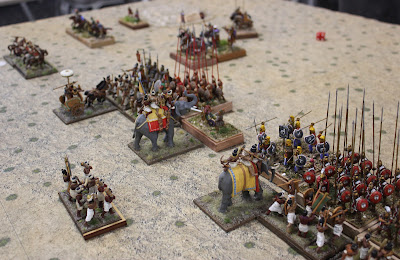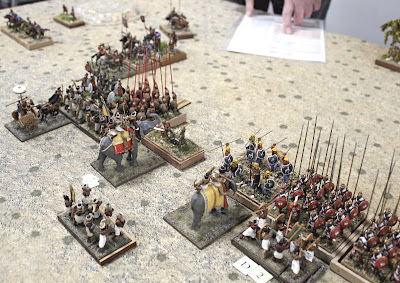Monday, February 25, 2019
Iberian Cavalry
Here are some armoured Ancient Spanish cavalry from the Victrix Miniatures plastic set Iberian Cavalry. They are great figures to paint, really detailed and easy to put together. The shield transfers are by Victrix as well. I tried to finish these for our recent Command and Colors Ancients game of the Battle of Ilipa but didn't quite get there in time.
Saturday, February 23, 2019
Battle at Fort Guinnion Dux Bellorum Game
 |
| Saxons on the left, Romano-British on the right |
 |
| View from the Saxon line |
 |
| Armies advance |
 |
| Brits charge on the left and right flanks |
 |
| Saxon Ordinary Riders charge |
 |
| Command points are evenly distributed |
 |
| Saxons retreat |
Last Saturday afternoon Craig came over to my place and we played the fifth game in our Dux Bellorum campaign, The Raiding Season, based on the Age of Arthur WAB supplement (pp. 133-135). Our last game was a mighty victory for the Saxons over the Romano-British, so the scenario this time was The Battle at Fort Guinnon (pp.106-107) with the both sides fielding standard 32 points armies. The objective in our game was simply revenge and destruction of the enemy.
Both armies advanced and quickly engaged. After a couple of turns the battle formed in to four distinct combats and as casualties mounted, command points were lost. This left both sides with limited options for subsequent turns. The Saxons started retreating and were gradually worn down by the Brits. In the end they suffered fifty percent casualties and a couple of units failed their Bravery tests and the entire army routed. This was a Mighty Victory for the Brits leading in to the sixth and final game of the campaign.
 |
| The battle forms four distinct combats |
 |
| Command points are lost as casualties mount |
 |
| Saxons retreat in some combats but hold on in others |
 |
| Brit Mounted Companions get in a flank charge |
 |
| Brit Noble Riders and Saxon Ordinary Riders fight it out |
 |
| Saxons rout |
Thursday, February 14, 2019
Battle of Ilipa 206 BC - Command and Colors Ancients
 |
| Romans on the left, Carthaginians on the right |
 |
| View from the Carthaginian lines |
 |
| View from the Roman lines |
 |
| Velites attack Carthaginian Elephants |
 |
| Carthaginian right flank |
 |
| Roman left flank |
 |
| Velites are forced to retreat |
 |
| Marcius with Principes and Triarii |
 |
| Scipio with Principes and Hastai |
Last Wednesday night Rick and I met down at the Vikings Club and played a Second Punic War Command and Colors Ancients game. The scenario was the Battle of Ilipa 206 BC in Spain with Scipio taking on Hasdrubal Gisgo. Rick commanded the Romans while I commanded the Carthaginians. Although the Carthaginians out numbered the Romans by a single unit in the scenario, they were up against it with only four command cards and a single commander, compared to the Romans six command cards and two commanders. In the end the Romans won a decisive victory with seven to two victory banners. The game followed the actual historical result with the Romans winning on both flanks while the Carthaginian centre was stranded.
 |
| Action on the Carthaginian right flank |
 |
| Carthaginian centre |
 |
| Hasdrubal Gisgo and Libyan spearmen |
 |
| Gallic cavalry and Carthaginian elephants |
 |
| Spanish Scutarii and Caetrati attack |
 |
| Gallic cavalry attack Velites to no effect |
 |
| Roman cavalry account for Numidian cavalry |
 |
| Carthaginian elephants are destroyed - the final nail in the coffin! |
Monday, February 11, 2019
Mauryan Indians versus Early Seleucids L'Art de La Guerre Game
 |
| Side view of the table - Indians on the left, Seleucids on the right |
 |
| View from the opposite end |
 |
| Seleucid pike & Persian Takabara peltasts |
 |
| Seleucid pike, peltasts and camp in the centre |
 |
| Indian right flank |
 |
| Indian centre |
 |
| Indian attackers advance |
 |
| Indian left flank |
Last Sunday down at the Vikings Club in Lanyon, Garry, Craig and I played a standard 200 point L'Art de la Guerre (ADLG) game, with Mauryan Indians versus Early Seleucids. Garry commanded the Seleucids while Craig and I commanded the Indians. This turned out to be a fairly easy victory for the Seleucids. The Indians entertained hope for some time, until the Seleucid pike in the centre charged home and large gaps started to appear in the Indian centre. The Indians were on the verge of demoralisation and conceded the game.
 |
| Indian chariots and cavalry charge |
 |
| Indian longbow try to wear down the pike |
 |
| Seleucid pike charge in the centre |
 |
| Indian elephants take on the peltasts |
 |
| Action in the centre |
 |
| Indian left flank |
 |
| Gaps appear in the Indian centre |
 |
| Indians are on the verge of demoralisation |
Subscribe to:
Comments (Atom)
Late Roman Infantry - Prima Flavia Gallicana Constantia
Here are some Late Roman infantry from the archives. These are the Prima Flavia Gallicana Constantia, a pseudocomitatenses unit listed in ...

-
Battle of Colline Gate - Sulla leads his troops out of Rome Kevin suggested I do a post about playing Command and Colors Ancients ...
-
Vikings initial deployment Irish initial deployment Irish warriors Irish slingers Irish chieftain and warriors Irish warriors Last Sunday ...





